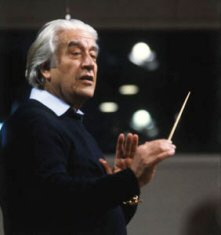- Sergiu Celibidache
Infobox musical artist
Name = Sergiu Celibidache

Landscape = Sergiu Celibidache
Background = classical_ensemble
Born = birth date|1912|06|28
flagicon|ROM Roman,Romania
Died = death date and age|1996|08|14|1912|06|28
La Neuville-sur-Essonne, Pithiviers,France
Genre = Classical
Occupation = Conductor,pedagogue
Years_active = 1945-1996
Associated_acts =Berliner Philharmoniker Rundfunk-Sinfonieorchester Berlin Munich Philharmonic
Stuttgart Radio Symphony
Swedish Radio Symphony
URL =Sergiu Celibidache (IPA2|/'ser.ʤju ʧe.li.bi'da.ke/; ser-joo chay-lee-bee-DAH-kay) (
June 28 ,1912 –August 14 ,1996 ) was a Romanian-born German conductor.Biography
Celibidache was born in
Roman, Romania , and began his studies in music with the piano, after which he studied music, philosophy and mathematics inBucharest , Romania and then in Paris. One of the most important influences in his life was his introduction toMartin Steinke , who, being knowledgeable aboutBuddhism , heavily affected Celibidache's outlook for the rest of his life.Career
He studied in
Berlin and, from 1945 to 1952, he was principal conductor of theBerlin Philharmonic . He later worked with radio orchestras inStockholm ,Stuttgart andParis . In 1970 he was awardedDenmark 'sSonning Award . From 1979 until his death he was music director of theMunich Philharmonic . He regularly taught atMainz University in Germany and in 1984 taught at theCurtis Institute inPhiladelphia, Pennsylvania . Teaching was a major focus throughout his life and his courses were frequently open to all without fee.Celibidache's approach to music-making is often described in terms of what he did not do instead of what he did. For example, much has been made of Celibidache's "refusal" to make recordings even though almost all of his concert activity actually was recorded with many released posthumously by major labels such as
EMI andDeutsche Grammophon with consent of his family. [cite news | url=http://query.nytimes.com/gst/fullpage.html?res=9C0DE6D91330F936A25750C0A96E958260 | title=The Reticent High Priest of Munich | work=New York Times | author=James R. Oestreich | date=15 March 1998 | accessdate=2007-08-31] Nevertheless, Celibidache did pay little attention to making these recordings, which he viewed merely as by-products of his orchestral concerts.Celibidache's focus was instead on creating, during each concert, the optimal conditions for a what he called a "transcendent experience". Aspects of
Zen Buddhism , such as "ichi-go ichi-e ", were strongly influential on him. He believed that musical experiences were extremely unlikely to ensue when listening to recorded music, so he eschewed them. As a result, some of his concerts did provide audiences with exceptional and sometimes life-altering experiences, including, for example, a 1984 concert inCarnegie Hall by the Orchestra of theCurtis Institute that New York Times criticJohn Rockwell touted as the best of his twenty-five years of concert-going. [cite news | url=http://query.nytimes.com/gst/fullpage.html?res=9903E1D71739F93BA15751C0A962948260 | title=Debut of Sergiu Celibidache | work=New York Times | author=John Rockwell | date=February 28 1984 | accessdate=2007-10-07]Celibidache was well known for his demands for extensive rehearsal time with orchestras. [cite news | url=http://query.nytimes.com/gst/fullpage.html?res=950DE7DC113BF934A15757C0A96F948260 | title=Sergiu Celibidache Conducts An Unhurried Bruckner 4th | work=New York Times | author=Will Crutchfield | date=27 April 1989 | accessdate=2007-08-31] An oft-mentioned feature of many of his concerts, captured in the live recordings of them, is a slower tempo than what is considered the norm, while, in fast passages, his tempos often exceeded expectations. [cite news | url=http://query.nytimes.com/gst/fullpage.html?res=9F0CE7DE1538F93AA1575BC0A965958260&sec=&spon=&pagewanted=2 | title=When Mystic Meets Mystic | work=New York Times | author=John Rockwell | date=29 August 1993 | accessdate=2007-08-31] In Celibidache's own view, however, criticism of a recording's tempo is irrelevant, as it is not (and cannot) be a critique of the performance but rather of a transcription of it, without the ambience of the moment – for him, a key factor in any musical performance. As Celibidache explained, the acoustic space in which one hears a concert directly affects the likelihood of the emergence of his sought-after transcendent experience. The acoustic space within which one hears a recording of one of his performances, on the other hand, has no impact on the performance, as it is impossible for the acoustic features of that space to provide feedback to the musicians that might impel them to, for example, play slower or faster.
That his recorded performances differ so widely from the majority of other recordings has led them to be seen by some as collectors' items rather than mainstream releases, 'one-offs' rather than reference recordings. [cite web | author= | title=Conductor Sergiu Celibidache Biography | url=http://www.iclassics.com/artistBio?contentId=8371 | publisher=iClassics | date= | accessdate=2007-08-17] The reality is that the recordings and their relationship to other recordings are the arena within which his artistic importance is now judged, while the contributions he made in the concert hall fade along with the memories of those who were there.
Notable releases have been his Munich performances of Beethoven,
Johannes Brahms ,Anton Bruckner ,Robert Schumann ,Johann Sebastian Bach ,Gabriel Fauré and a series of live performances with theLondon Symphony Orchestra and theStuttgart Radio Symphony Orchestra .One controversial incident during his tenure with the Munich Philharmonic was a protracted legal battle to oust principal trombonist Abbie Conant that lasted 12 years, with Conant ultimately prevailing. Ms. Conant alleged sexism in an [http://www.osborne-conant.org/ladies.htm internet article] published by her husband, William Osbourne. The controversy is discussed in
Malcolm Gladwell 's book "Blink".Celibidache died in
La Neuville-sur-Essonne , arrondissement Pithiviers nearParis in 1996 at 84.References
External links
*allmusic|41:16797
* [http://www.gerhard-greiner.de/homepage.htm Sergiu Celibidache discography]
* [http://www.classicalnotes.net/columns/celiweb.html "Life After Death" Reviews of posthumous Celibidache CD releases]
* [http://parsmedia.com/main/content.php?id=theory-celi_jsg Jan Schmidt-Garre: Celibidache's Presence of Mind]
* [http://www.classicstoday.com/features/f1_0999.asp Sergiu Celibidache - The Last of the Mad Genius Conductors?]
Wikimedia Foundation. 2010.
